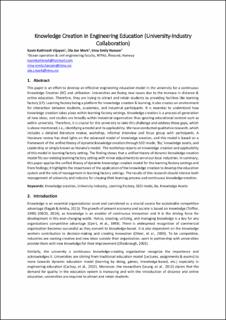Knowledge Creation in Engineering Education (University-Industry Collaboration)
Chapter
Accepted version
Permanent lenke
https://hdl.handle.net/11250/2988721Utgivelsesdato
2018Metadata
Vis full innførselSamlinger
Originalversjon
Proceedings of the 19th European Conference on Knowlege ManagementSammendrag
This paper is an effort to develop an effective engineering education model in the university for a continuous Knowledge Creation (KC) and utilization. Universities are facing new issues due to the increase in distance & online education. Therefore, they are trying to attract and retain students by providing facilities like learning factory (LF). Learning factory being a platform for knowledge creation & learning, it also creates an environment for interaction between students, academics, and industrial participants. It is essential to understand how knowledge creation takes place within learning factory settings. Knowledge creation is a process of generation of new ideas, and studies are broadly within industrial organization thus ignoring educational context such as within university. Therefore, it is crucial for the university to take this challenge and address these gaps, which is above mentioned, i.e., identifying a model and its applicability. We have conducted qualitative research, which includes a detailed literature review, workshop, informal interview and focus group with participants. A literature review has shed lights on the advanced model of knowledge creation, and this model is based on a framework of the unified theory of dynamic knowledge creation through SECI mode, ‘Ba,’ knowledge assets, and Leadership or simply known as Nonaka’s model. The workshop reports on knowledge creation and applicability of this model in learning factory setting. The finding shows that a unified theory of dynamic knowledge creation model fits our existing learning factory setting with minor adjustments to serve our local industries. In summary, this paper applies the unified theory of dynamic knowledge creation model for the learning factory settings and from findings; it highlights the importance of the application of the knowledge creation to develop the education system and the role of management in learning factory settings. The results of this research should interest both management of university and industry for shaping their learning process and continuous knowledge creation. Knowledge Creation in Engineering Education (University-Industry Collaboration)
